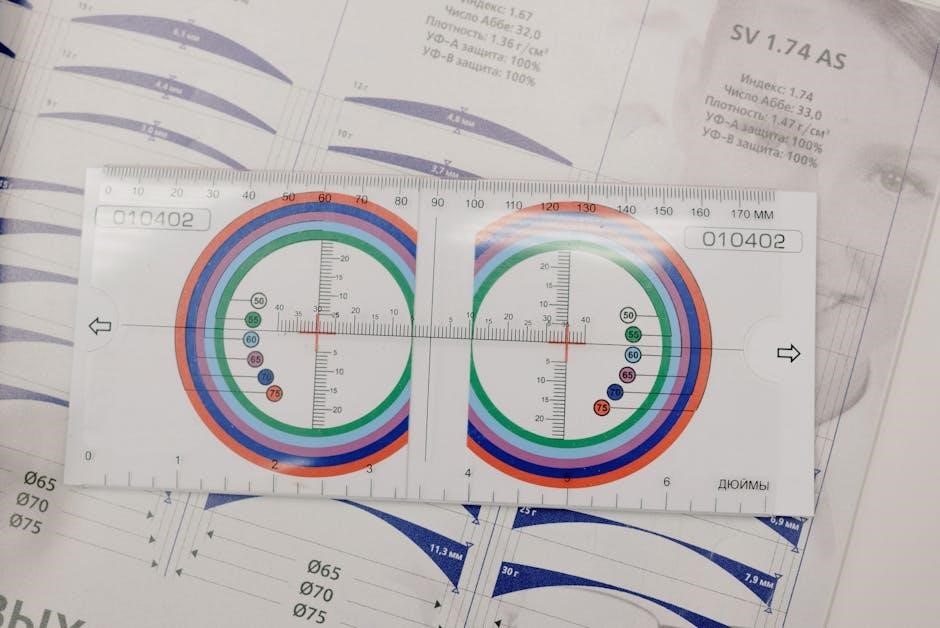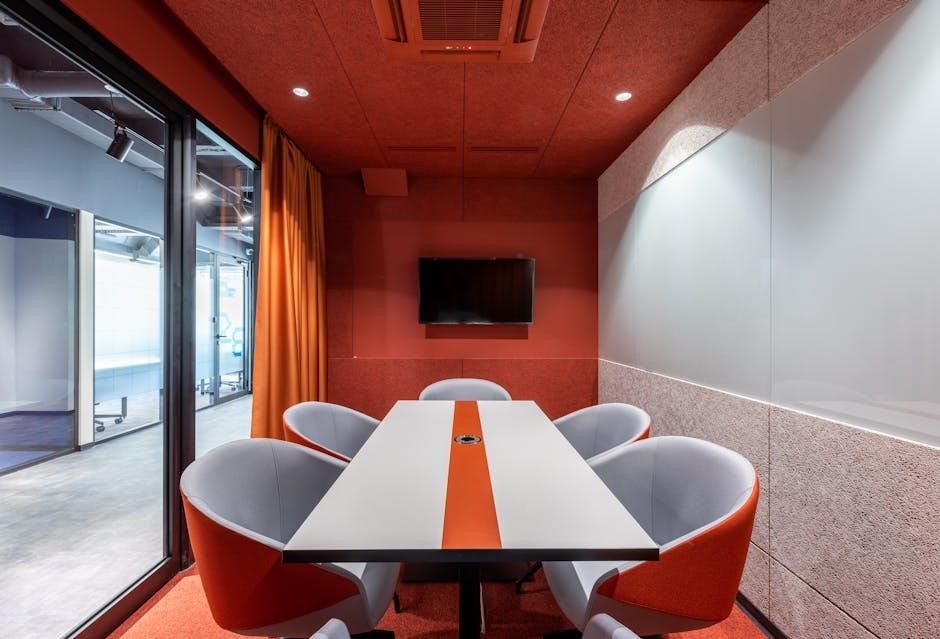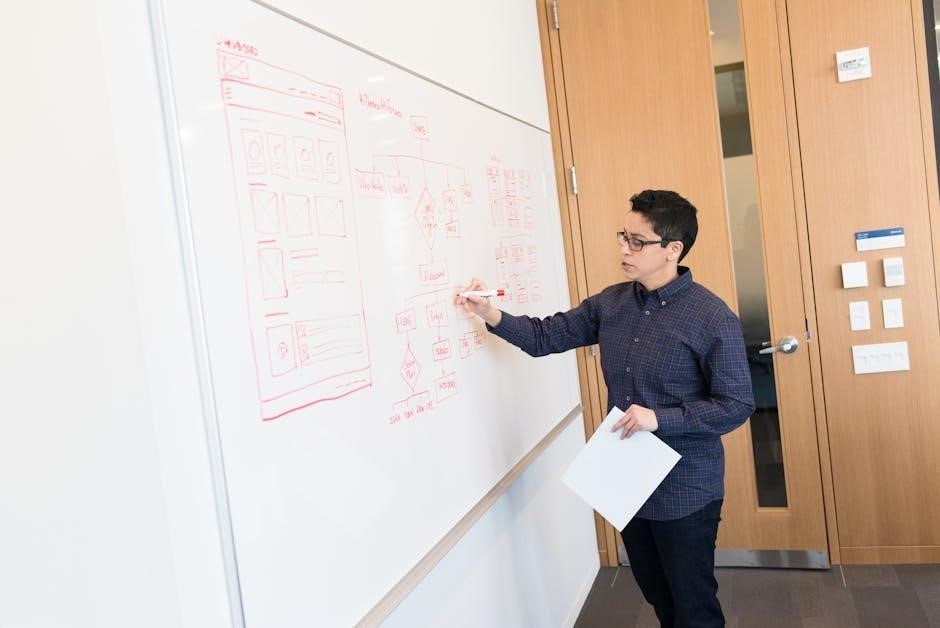Instructional design conferences gather experts to share innovative practices, discuss emerging trends, and explore tools shaping modern education. These events foster collaboration, learning, and professional growth, ensuring attendees stay ahead in the evolving field of instructional design.
Overview of Instructional Design
Instructional design is a systematic process for creating effective learning experiences. It involves analyzing learning needs, designing content, developing materials, implementing strategies, and evaluating outcomes. This field focuses on improving how knowledge and skills are acquired, ensuring engaging and impactful learning. Instructional designers use various models, such as ADDIE, to structure their work. The goal is to align learning objectives with learner needs, leveraging technology and innovative methods. Instructional design applies across education, corporate training, and e-learning, aiming to enhance performance and understanding. By prioritizing clarity, interactivity, and accessibility, instructional design ensures that learners achieve desired outcomes efficiently.
Importance of Attending Conferences
Attending instructional design conferences is crucial for professional growth and staying updated on industry trends. These events provide unparalleled networking opportunities, allowing attendees to connect with experts, share ideas, and collaborate on innovative projects. Conferences also offer access to cutting-edge tools, research, and best practices, enabling designers to enhance their skills and deliver more effective learning experiences. By participating in workshops and sessions, professionals gain hands-on experience with emerging technologies and methodologies. Additionally, conferences inspire creativity and provide insights into solving complex educational challenges. They serve as a platform for learning from industry leaders and gaining practical knowledge that can be immediately applied in real-world scenarios, making them indispensable for both seasoned professionals and newcomers alike.
Key Themes in Instructional Design Conferences
Instructional design conferences often focus on emerging trends like microlearning, gamification, and the integration of artificial intelligence (AI) in education. These events explore how to create engaging, accessible, and personalized learning experiences. Discussions frequently revolve around the use of data analytics to measure learning outcomes and the role of xAPI in tracking performance. Accessibility is another critical theme, emphasizing inclusive design to cater to diverse learner needs. Additionally, conferences highlight the shift from content creation to curation, addressing how to effectively organize and deliver existing resources. These themes collectively aim to enhance the quality and effectiveness of instructional design, ensuring it aligns with modern educational demands and technological advancements.

Major Instructional Design Conferences
Major instructional design conferences include OLC Accelerate, ISDDE, IDSA Education Symposium, ITC eLearning Conference, and Learning Solutions, focusing on innovation, research, and networking in the field.
Online Learning Consortium (OLC) Accelerate

The Online Learning Consortium (OLC) Accelerate conference is a premier event for educators, instructional designers, and ed-tech professionals. Held both virtually and in-person, it focuses on innovative research and effective practices in online, blended, and digital learning. The 2023 conference took place virtually from October 3-5 and in Washington, D.C., from October 24-27. OLC Accelerate emphasizes impactful strategies, showcasing the latest advancements in online education. Attendees gain insights through workshops, presentations, and networking opportunities, making it a must-attend event for those shaping the future of digital learning.
International Society for the Design and Development of Education (ISDDE) Conference
The International Society for the Design and Development of Education (ISDDE) Conference is an annual event that brings together educational designers, researchers, and practitioners. The 18th annual conference was held in Boston, Massachusetts, from October 16-19, 2023. It focuses on science, mathematics, engineering, and technology education, providing a platform for sharing innovative designs and research. Attendees gain insights into cutting-edge practices, collaborate with peers, and explore emerging trends in educational design. The conference emphasizes hands-on learning, case studies, and interactive sessions, making it a valuable resource for those passionate about advancing education through design.
Industrial Designers Society of America (IDSA) Education Symposium
The Industrial Designers Society of America (IDSA) Education Symposium is a premier event for design educators, practitioners, and students. Held annually, it focuses on advancing design education and research, with the 2023 symposium themed “The Watering Hole.” This event explores the current state of design, fostering dialogue to shape its future. Attendees engage in discussions on design theory, curricula development, and innovative solutions. The symposium includes main stage presentations, live-streaming for virtual participants, and post-event recordings. It is part of IDSA’s commitment to education, celebrating academic excellence and fostering connections within the global design community. The event highlights IDSA’s role in nurturing creativity and learning, making it a cornerstone for design professionals worldwide.
Instructional Technology Council (ITC) eLearning Conference
The Instructional Technology Council (ITC) eLearning Conference is a premier event for eLearning practitioners, offering a collaborative environment to share knowledge and innovations. Held annually, the 2023 conference took place in Las Vegas, NV, from February 12-15, featuring workshops, sessions, and networking opportunities. It focuses on advancing eLearning strategies, tools, and best practices, catering to educators, instructional designers, and technology experts. The conference emphasizes practical applications, hands-on experiences, and peer-to-peer learning, making it a valuable resource for professionals seeking to enhance their skills and stay updated on industry trends. Attendees gain insights into emerging technologies and effective instructional design methods, fostering a community dedicated to improving online and hybrid learning experiences.
Learning Solutions Conference
The Learning Solutions Conference, produced by the Learning Guild and supported by Training Industry, is a leading event for corporate training and instructional design professionals. Focused on strategies, skills, and solutions, it addresses the challenges faced by learning teams daily. The 2023 conference introduced the Instructional Design Summit, featuring 25 curated sessions tailored for both newcomers and experienced professionals. This event emphasizes practical applications, hands-on workshops, and real-world case studies. Attendees gain insights into cutting-edge tools, methodologies, and trends, while networking with industry experts. The conference is known for its comprehensive approach, covering eLearning, instructional design, and performance improvement, making it a must-attend for those seeking to enhance their expertise and stay updated on industry advancements.
Trends in Instructional Design
Current trends include microlearning, gamification, AI integration, accessibility focus, and xAPI adoption. These innovations enhance engagement, personalize learning, and streamline content creation for modern educational needs.
Microlearning and Its Impact
Microlearning has emerged as a powerful trend in instructional design, focusing on short, focused learning sessions. It enhances knowledge retention by delivering concise, digestible content, perfect for busy professionals. This approach aligns with modern learners’ preferences for flexibility and efficiency. By breaking down complex topics into bite-sized modules, microlearning reduces cognitive overload and increases engagement. Its impact is evident in corporate training and educational settings, where it improves performance and adapts to diverse learning styles. The ability to access microlearning content on multiple devices further boosts its accessibility, making it a cornerstone of contemporary instructional design strategies.
Gamification in Instructional Design
Gamification is revolutionizing instructional design by incorporating game-like elements, such as points, badges, and leaderboards, to enhance engagement. This approach makes learning interactive and fun, increasing learner participation and motivation. By leveraging competition and rewards, gamification fosters a sense of achievement, encouraging learners to complete tasks and master content. It also promotes active learning, critical thinking, and problem-solving skills. Gamification aligns with modern learners’ preferences for dynamic, immersive experiences, making it a key trend in instructional design conferences. Its effectiveness spans corporate training, education, and eLearning, offering a versatile tool to cater to diverse learning styles and preferences.

Artificial Intelligence in Instructional Design

Artificial Intelligence (AI) is transforming instructional design by enabling personalized learning experiences, automating content creation, and enhancing data-driven decision-making. AI-powered tools analyze learner behavior, tailoring curricula to individual needs and preferences. This technology also streamlines the development process, allowing designers to create adaptive learning paths and real-time assessments. AI-driven chatbots and virtual assistants provide immediate feedback, fostering engagement and improving outcomes. Additionally, AI facilitates the curation of relevant content, ensuring materials remain up-to-date and aligned with learning objectives. While ethical considerations, such as data privacy, must be addressed, AI’s potential to revolutionize instructional design is immense, making it a focal point in modern conferences and discussions.
Accessibility in Instructional Design
Accessibility in instructional design ensures that learning materials and experiences are usable by everyone, including individuals with disabilities. Conferences emphasize the importance of creating inclusive content by adhering to accessibility standards like WCAG and Section 508. Strategies include using alt text for images, closed captions for videos, and keyboard-navigable interfaces. Tools like screen readers and adjustable font sizes are highlighted to enhance learner engagement. Accessibility is not just a legal requirement but a moral imperative, fostering equity in education. Instructional design conferences often feature workshops on designing accessible courses, demonstrating how to integrate accessibility into every stage of content creation. By prioritizing accessibility, designers ensure that all learners can participate fully and benefit from educational opportunities.
The Role of xAPI in Modern Instructional Design
The Experience API (xAPI) plays a pivotal role in modern instructional design by enabling the tracking of learning experiences across various platforms and devices. Unlike traditional LMS metrics, xAPI captures nuanced interactions, such as simulations, games, and real-world applications, providing deeper insights into learner behavior. This data-rich approach allows instructional designers to refine content, identify knowledge gaps, and tailor experiences to individual needs. xAPI also facilitates seamless integration with Learning Record Stores (LRS), enabling organizations to centralize learning data and analyze performance comprehensively. By leveraging xAPI, designers can create adaptive learning paths, measure informal learning, and enhance overall learning outcomes, making it a cornerstone of data-driven instructional design strategies.

Networking Opportunities
Instructional design conferences offer invaluable networking chances, enabling professionals to connect with peers, share insights, and collaborate on innovative projects, fostering growth and industry advancement.
In-Person Networking Events
In-person networking events at instructional design conferences provide face-to-face interaction, fostering meaningful connections. These events include workshops, roundtable discussions, and social gatherings, allowing professionals to collaborate and share ideas. Conferences like OLC Accelerate and ISDDE offer dedicated networking sessions, while IDSA’s Education Symposium emphasizes community building. Attendees can engage in hands-on activities, meet industry leaders, and participate in collaborative problem-solving. Such events create opportunities for mentorship, partnerships, and career advancement. They also provide a platform to discuss challenges and innovations, enriching the overall conference experience. In-person networking remains a cornerstone of these events, enabling lasting professional relationships and a stronger sense of community within the field.

Virtual Networking Platforms
Virtual networking platforms have become integral to instructional design conferences, offering flexible engagement for global participants. These platforms provide live-streamed sessions, chat forums, and virtual lounges, enabling real-time interaction. Conferences like OLC Accelerate and the Instructional Design Summit leverage these tools to connect attendees remotely. Virtual networking allows professionals to share insights, collaborate on projects, and expand their networks without physical constraints. Features like video conferencing, breakout rooms, and Q&A sessions enhance engagement. These platforms also offer on-demand access to recorded content, extending learning opportunities. Virtual networking complements in-person events, ensuring inclusivity and accessibility for all participants. They foster meaningful connections, making conferences more dynamic and inclusive, regardless of location.
Building Professional Connections
Instructional design conferences provide unparalleled opportunities for building professional connections. Attendees can engage with experts, thought leaders, and peers through workshops, roundtables, and social events. These interactions foster collaboration, knowledge sharing, and mutual support. Conferences like OLC Accelerate and ISDDE offer dedicated networking sessions, enabling professionals to expand their networks. Mentorship programs and collaborative projects often emerge from these connections, enriching career growth. The inclusive environment of these events ensures that both newcomers and seasoned professionals can thrive. By fostering relationships, instructional design conferences create a vibrant community that continues to evolve and innovate long after the event concludes, providing lasting value for all participants.
Workshops and Hands-On Sessions
Instructional design conferences offer diverse workshops and hands-on sessions, providing practical skills and tools for eLearning development, instructional strategies, and interactive content creation, led by industry experts.
Pre-Conference Workshops
Pre-conference workshops at instructional design conferences offer in-depth, hands-on training sessions led by industry experts. These workshops provide participants with practical skills and tools to enhance their instructional design capabilities. Topics often include eLearning development, instructional strategies, and emerging technologies. Attendees can engage in interactive activities, case studies, and group projects, allowing for immediate application of learned concepts. These sessions are ideal for both newcomers and seasoned professionals looking to refine their expertise. Many conferences, such as the OLC Accelerate and Learning Solutions Conference, feature pre-conference workshops as a way to kickstart the event with focused, intensive learning experiences. These workshops are a valuable addition to the main conference program, offering targeted professional development opportunities.
Hands-On Sessions with Instructional Design Tools
Hands-on sessions with instructional design tools are a cornerstone of many conferences, offering participants the chance to explore and experiment with cutting-edge technologies. These interactive sessions allow attendees to work directly with tools like Articulate Storyline, Adobe Captivate, and Lectora, guided by industry experts. Participants can create eLearning content, design simulations, and implement gamification elements in real time. These sessions are tailored to all skill levels, from beginners learning the basics to advanced designers refining their techniques. By providing a practical, immersive experience, these workshops bridge the gap between theory and application, ensuring attendees leave with actionable skills and confidence in using the latest tools to enhance their instructional design projects.
Interactive Labs and Simulations
Interactive labs and simulations at instructional design conferences offer immersive, experiential learning opportunities. These sessions allow participants to engage with real-world scenarios, testing instructional strategies and tools in a controlled environment. Attendees can experiment with cutting-edge technologies, such as virtual reality (VR) and augmented reality (AR), to create interactive learning experiences. Simulations often focus on specific challenges, like designing microlearning modules or implementing gamification elements, providing practical insights and skills. These hands-on experiences are designed to cater to diverse skill levels, from novices exploring foundational concepts to advanced designers refining complex interactions. By combining theory with practice, interactive labs and simulations empower professionals to innovate and enhance their instructional design capabilities effectively.

The Future of Instructional Design
The future of instructional design emphasizes innovative technologies like AI, VR, and AR, fostering personalized, immersive learning experiences. These advancements promise to revolutionize how content is created and delivered.
Virtual and Augmented Reality in Instructional Design
Virtual and augmented reality are transforming instructional design by creating immersive, interactive learning environments. These technologies enable learners to engage in simulations, explore complex concepts visually, and practice skills in realistic scenarios. Conferences highlight how VR and AR enhance engagement, improve retention, and provide personalized learning experiences. For instance, VR allows learners to participate in virtual labs or historical reenactments, while AR overlays digital information onto real-world objects, making learning more contextual. These tools are particularly valuable in fields like healthcare, engineering, and corporate training, where hands-on practice is essential. As these technologies evolve, they promise to redefine how content is designed and delivered, offering unprecedented opportunities for innovative and effective instruction.
From Creation to Curation: The Evolution of Content Design
The shift from content creation to curation reflects a growing emphasis on organizing and contextualizing existing resources. With the abundance of digital content, instructional designers now focus on selecting, refining, and presenting relevant materials to meet specific learning objectives. This evolution ensures that learners receive tailored, high-quality experiences rather than generic information. Conferences highlight strategies like personalized learning paths, microlearning, and the use of AI-driven tools to enhance curation. By prioritizing curation, designers can address individual needs, reduce information overload, and improve learning outcomes. This approach not only streamlines the design process but also fosters more engaging and effective learning experiences, making it a cornerstone of modern instructional design.
The Role of Data Analytics in Instructional Design
Data analytics plays a pivotal role in shaping modern instructional design by providing insights into learner behavior and engagement. Through tools like xAPI and learning analytics platforms, designers can track performance metrics, identify knowledge gaps, and refine content. This data-driven approach enables personalized learning experiences, improving outcomes and efficiency. Conferences often highlight how analytics inform design decisions, such as adapting content to learner preferences or optimizing assessment strategies. By leveraging data, instructional designers can create more impactful and responsive learning environments, ensuring resources are used effectively. As technology advances, the integration of AI and machine learning further enhances the potential of data analytics in instructional design, making it a cornerstone of future educational strategies.

Instructional Design for Corporate Training
Instructional design optimizes corporate training by aligning learning objectives with business goals, enhancing employee performance through structured content and innovative delivery methods, fostering workplace skill development and engagement.
Learning and Development Strategies
Learning and development strategies are central to instructional design conferences, focusing on creating effective, engaging, and measurable training programs. These strategies emphasize aligning learning objectives with organizational goals, leveraging data analytics to track performance, and incorporating innovative tools like microlearning and gamification. Conferences such as OLC Accelerate and Learning Solutions highlight the importance of personalized learning experiences, adaptive assessments, and the integration of emerging technologies. Experts share best practices for designing curricula that cater to diverse learner needs, ensuring content is accessible and impactful. By exploring these strategies, professionals can enhance employee skill development, improve retention, and drive business success through tailored instructional design approaches. These discussions are pivotal for modern corporate training environments.
Corporate Training and Development Conferences

Corporate training and development conferences are essential for professionals seeking to enhance workplace learning and performance. These events focus on strategies to align training programs with business objectives, fostering employee growth and organizational success. Conferences like the Learning Solutions Conference and ATD events emphasize the use of instructional design principles to create impactful corporate training. Attendees gain insights into emerging trends such as microlearning, gamification, and the use of xAPI to track learner engagement. These gatherings also provide opportunities to network with industry leaders and explore innovative tools and technologies. By attending, professionals can refine their skills in designing effective corporate training programs, ensuring employees acquire the skills needed to meet modern workplace demands and drive business results. These conferences are vital for staying updated on best practices in corporate instructional design.
Best Practices in Corporate Instructional Design
Best practices in corporate instructional design focus on aligning training with business objectives, ensuring engaging and effective learning experiences. Personalization, microlearning, and data-driven approaches are key strategies. Leveraging tools like xAPI to track learner engagement and measure impact is crucial. Accessibility is also a priority, ensuring all employees can benefit. Collaborative efforts between instructional designers and stakeholders help create relevant content. Continuous feedback loops refine programs, fostering improvement. These practices ensure corporate training is not only effective but also adaptable to evolving workplace needs, driving employee development and organizational success. By integrating these strategies, companies can build a skilled, agile workforce ready to meet future challenges. These best practices are often highlighted at instructional design conferences, providing professionals with actionable insights.
Conclusion
Instructional design conferences foster innovation, networking, and professional growth, shaping the future of education and corporate training through shared knowledge and cutting-edge strategies.
Summary of Key Takeaways
Instructional design conferences offer invaluable insights into emerging trends, innovative tools, and best practices, enabling professionals to enhance their skills and stay competitive. These events highlight the importance of microlearning, gamification, and AI in modern instructional design, while emphasizing accessibility and data analytics. Networking opportunities, both in-person and virtual, foster collaboration and professional growth. Workshops and hands-on sessions provide practical experience with cutting-edge technologies, preparing attendees for future challenges. The integration of VR/AR and the evolution of content curation are reshaping the field, making conferences a vital resource for staying informed. By attending, professionals gain actionable strategies to improve learning experiences, ensuring they remain at the forefront of instructional design.
Final Thoughts on the Importance of Conferences
Instructional design conferences are indispensable for professionals seeking to enhance their expertise and stay updated on industry trends. These events provide a platform for sharing ideas, learning from experts, and gaining hands-on experience with innovative tools. Networking opportunities allow attendees to build lasting connections, fostering collaboration and career growth. Conferences also inspire creativity and innovation, encouraging professionals to adopt new strategies and technologies. By attending, individuals not only improve their skills but also contribute to the evolution of instructional design. The collective knowledge and experiences shared at these events create a ripple effect, benefiting organizations and learners worldwide. Ultimately, conferences are a cornerstone for professional development in the dynamic field of instructional design.